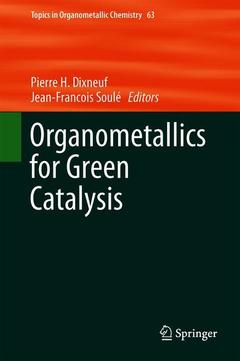Organometallics for Green Catalysis, 1st ed. 2019 Topics in Organometallic Chemistry Series, Vol. 63
Coordonnateurs : Dixneuf Pierre H., Soulé Jean-François

This volume presents the latest developments in the use of organometallic catalysis for the formation of bulk chemicals and the production of energy, via green processes including efficient utilization of waste feedstocks from industry. The chemistry of carbon dioxide relating to its hydrogenation into methanol ?an eco-friendly energy storage strategy? and its uses as C1 synthon for the formation of important building-blocks for fine chemicals industry are covered. Catalytic hydrogenations of various functional groups and hydrogen transfer reactions including the use of first row metal catalysts are presented as well as the conversion of alcohols to carboxylates via hydrogen transfer with a zero-waste strategy using water. Transformation of renewable or bio-based raw materials is surveyed through alkene metathesis and C?O bond activations and functionalizations. A green aspect for selective formation of C-C, C-O and C-N bonds involves direct regioselective C?H bond activations and functionalizations. These transformations can now be promoted under mild reaction conditions due to the use photoredox catalyts. C?H bond oxidation using visible light leads mainly to the formation of C?O and C?N bonds, whereas cross-coupled C?C bonds can be formed through the radical additions on (hetero) arenes using photoredox assisted mechanism.
Provides an overview of the latest innovative organometallic catalysts including pincer and cyclometalated complex structures
Discusses transformation of raw-materials into fine chemicals involving CO2 transformations and Hydrogen transfer reactions
Presents recent advances in activation of C-O bonds and Functionalization of C–H bonds using light energy
Date de parution : 03-2019
Ouvrage de 301 p.
15.5x23.5 cm
Disponible chez l'éditeur (délai d'approvisionnement : 15 jours).
Prix indicatif 263,74 €
Ajouter au panierThèmes d’Organometallics for Green Catalysis :
Ces ouvrages sont susceptibles de vous intéresser

C-H Activation 316,49 €


